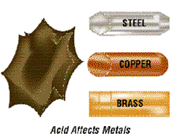Automotive tools & equipment
HVAC & Industrial supplies
Sales - parts -service
|
|
|
Moisture In A Refrigerant System Last Updated: 09/28/2007 |
|
Basically, moisture can be classified as visible and invisible. Occasionally, liquid water is found in systems, but this is unusual. Invisible moisture, or water vapor, is the culprit which causes the greatest trouble in refrigeration and air conditioning systems. A single drop of water may look harmless, but to a refrigerant system, it is a monster, the number one enemy of service technicians. What makes it so formidable is the fact that moisture enters a system easily and is hard to remove. Here is what it does to a system: First, it creates "freeze-ups." Moisture will be picked up by the refrigerant and be transported through refrigerant lines in a fine mist which forms ice crystals at the point of expansion (expansion valve).
Whether a "freeze-up" actually occurs depends primarily upon the amount of water and the Moisture in the form of water can cause corrosion after a period of time. However, moisture mixed with refrigerant creates much more corrosion trouble. Refrigerant such as R-12, containing chlorine, will slowly hydrolyze with water and form hydrochloric acids. This acid greatly increases the corrosion of metals and could corrode copper plating.
Refrigerant oil presents another problem caused by moisture. Refrigerant oil is an exception to the rule that "oil and water don't mix." In fact, refrigerant oil attracts moisture and will absorb it rapidly if left open to the atmosphere. Water-formed acid mixes with refrigerant oil, forming a closely bonded mixture of fine globules. The effect is called "sludging" and greatly reduces the oil's lubricating ability. Corrosion becomes troublesome from the operating standpoint when metallic surfaces are eaten away and a solid, detachable product is formed. This formation is also known as a "sludge." Sludge can cause a variety of problems. It will plug fine strainers, expansion valves and capillary tubes. And because it usually contains acids, sludge corrodes whatever it clings to, accelerating system damage. The most effective way to eliminate moisture from a system is with a good, high vacuum pump. |
 Ice crystals retard or stop the flow of the refrigerant, causing loss of cooling. As the expansion valve warms, due to the lack of refrigerant, the ice melts and passes through the expansion valve. The refrigerant will then start again until the moisture returns to the expansion valve and once more builds ice crystals. The result is intermittent cooling.
Ice crystals retard or stop the flow of the refrigerant, causing loss of cooling. As the expansion valve warms, due to the lack of refrigerant, the ice melts and passes through the expansion valve. The refrigerant will then start again until the moisture returns to the expansion valve and once more builds ice crystals. The result is intermittent cooling.  size of the ice particles formed. But a "freeze-up" is not the only problem caused by moisture. It can also cause corrosion, which can present serious trouble.
size of the ice particles formed. But a "freeze-up" is not the only problem caused by moisture. It can also cause corrosion, which can present serious trouble.  Heat increases the rate of corrosion due to acids because higher temperatures accelerate the acid-forming process. This acid attacks all the materials it contacts.
Heat increases the rate of corrosion due to acids because higher temperatures accelerate the acid-forming process. This acid attacks all the materials it contacts.